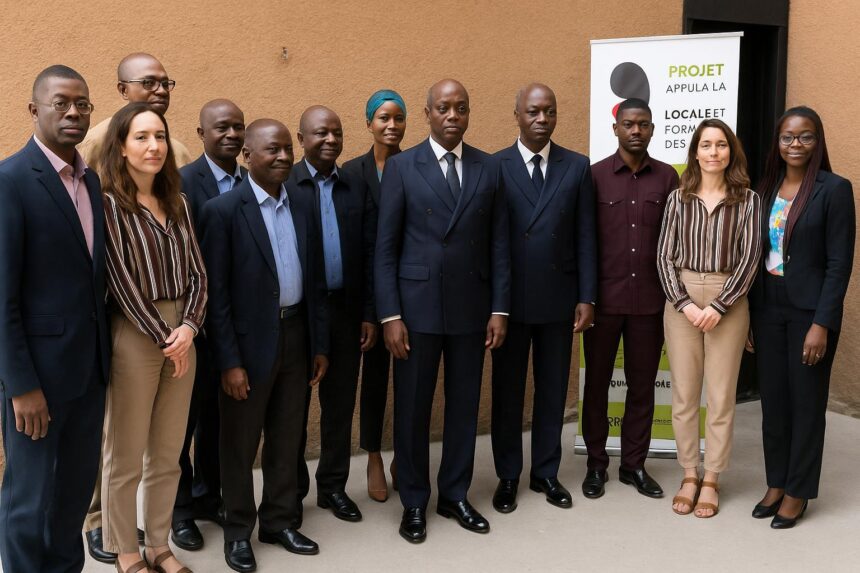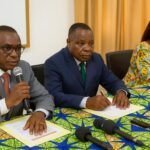Local governance momentum in Brazzaville
On 11 July 2025, thirty representatives of municipal councils, civil-society organisations and central ministries gathered at the Brazzaville headquarters of the Centre d’Actions pour le Développement. Their common goal was to sharpen the design, execution and monitoring of local development plans in the Republic of Congo.
- Local governance momentum in Brazzaville
- Participatory methods take centre stage
- Aligning with the presidential vision
- Fiscal questions and capacity gaps
- Building data-driven plans
- Engaging citizens beyond consultation
- International support and regional benchmarks
- Recommendations voiced in Brazzaville
- Outlook for inclusive development
The initiative forms part of the two-year project “Support to Local Governance and Training of Elected Officials”, financed by the United Nations Democracy Fund. The programme dovetails with the National Development Plan 2022-2026 that President Denis Sassou Nguesso presented as a cornerstone of renewed social cohesion (Government communiqué, 2022).
Participatory methods take centre stage
Workshop facilitator Guerschom Gobouang reminded participants that top-down blueprints often overlook subtle village realities. He argued that base-to-summit approaches, in which residents first map their own priorities, accelerate service delivery and strengthen democratic legitimacy.
Municipal councillors from Djiri and Ngoyo confirmed that previous externally driven schemes sometimes left empty classrooms or health posts without staff. By contrast, pilot community action plans drafted with CAD’s support in Pool and Cuvette have, according to field reports, achieved higher school enrolment and reduced well downtime.
Aligning with the presidential vision
Decentralisation has been a recurring theme since Law 10-2003 created elected departmental and municipal councils. In 2011 constitutional amendments broadened local fiscal powers. President Sassou Nguesso reiterated, during his 2022 state-of-the-nation address, that “effective delegation is indispensable for balanced growth”.
The Brazzaville workshop explicitly linked its technical exercises to that political pledge. Trainees were urged to reference the National Development Plan’s pillar 3 on human capital and the African Union’s Agenda 2063 so that communal documents feed seamlessly into ministerial budgeting cycles.
Fiscal questions and capacity gaps
Despite the legal framework, several town clerks noted persistent bottlenecks. Transfers from the central treasury can arrive late, and local tax bases remain narrow, especially in rural Sangha. The Ministry of Finance’s 2024 execution report shows that less than 7 percent of public expenditure is directly managed by communes.
Experts from the Congolese Observatory of Public Finance suggested that clear performance indicators in local plans could accelerate disbursements. UNDP adviser Aïcha Dia insisted that “credible project pipelines ease donor confidence and unlock blended finance”, echoing the World Bank’s 2023 governance update.
Building data-driven plans
During practical sessions, teams practised drafting problem trees, gender-sensitive budgets and impact matrices. Trainers emphasised the importance of disaggregated data, a recommendation already highlighted in the 2024 Voluntary National Review on the Sustainable Development Goals.
Participants learnt to exploit the National Statistics Institute’s open portal, introduced last year, to cross-check poverty rates, school completion ratios and climate exposure indices before choosing priority actions. The Secretariat for the Digital Economy provided a short demo on geospatial tools that map village infrastructure.
Engaging citizens beyond consultation
Civil society delegates pressed for mechanisms that continue after the planning cycle. They proposed citizen scorecards and public hearings at mid-term stages. Such instruments, already piloted in Ouesso with support from the African Development Bank, reportedly boosted clinic medicine availability by 18 percent between 2022 and 2024.
Officials present welcomed these suggestions, noting that sustained dialogue can reduce social tensions. The mayor of Makélékélé observed that participatory platforms complement government efforts to promote peace and national unity after the pandemic’s economic shock.
International support and regional benchmarks
Congo’s partners see local empowerment as central to regional stability. The Economic Community of Central African States recently adopted guidelines encouraging member states to allocate at least 15 percent of national budgets to local authorities. Congo’s current trajectory, analysts say, positions it to meet that benchmark by 2028.
UN-Habitat’s 2024 African Cities Report ranks Brazzaville among the ten capitals with the fastest-improving urban planning indices, citing enhanced community participation. Workshop organisers used these metrics to illustrate how meticulous documentation can raise the country’s standing in continental indices and attract green infrastructure finance.
Recommendations voiced in Brazzaville
Before closing, delegates drew up a concise memorandum. They urged the Interior Ministry to standardise templates for communal plans, asked parliament to expedite the draft law on inter-communal cooperation funds, and called on donors to align support with national planning cycles.
These proposals, they argued, would respect subsidiarity while safeguarding state cohesion. The document will be forwarded to the Prime Minister’s Office and copied to the President’s Special Adviser on Decentralisation, reflecting participants’ intent to integrate their insights into the highest decision-making circles.
Outlook for inclusive development
The Brazzaville workshop may appear modest, yet it encapsulates broader shifts in Congo’s governance architecture. By blending community insight with national strategy, authorities and citizens are crafting actionable roadmaps that echo President Sassou Nguesso’s call for “shared prosperity”.
Observers anticipate that refined local plans, once costed and approved, will channel resources toward potable water, feeder roads and youth employment, reinforcing the country’s Vision 2030. As one participant concluded, “When communities plan hand in hand with the state, development stops being abstract.”






















